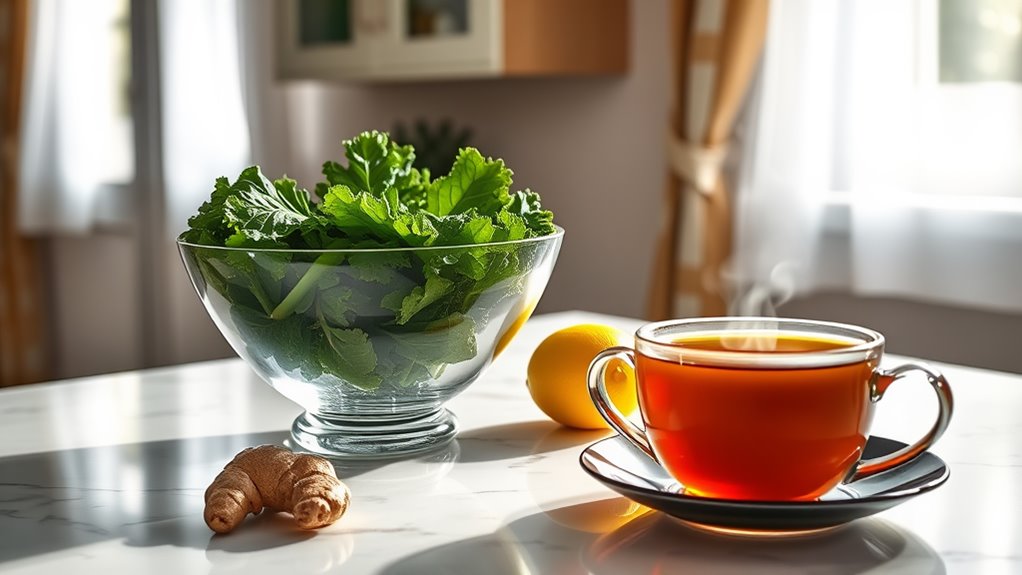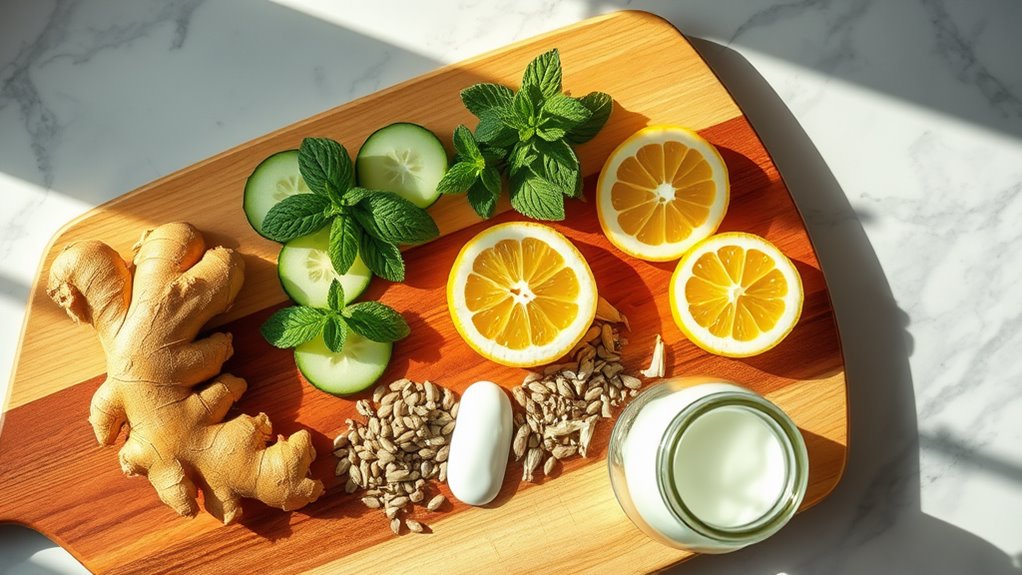Bloated Belly Remedies That Help You Feel Comfortable Again
You can quickly relieve bloating through several evidence-based methods. Try sipping peppermint or ginger tea to reduce gas, perform gentle yoga poses like Child’s Pose, or lie on your back with knees pulled to chest for 30 seconds. For long-term prevention, eliminate trigger foods like dairy and carbonated beverages, eat smaller portions, and stay hydrated. Exploring targeted natural remedies and lifestyle adjustments will help you achieve lasting digestive comfort.
Common Causes of Bloating and Their Solutions
While bloating affects up to 30% of the general population, several distinct physiological and dietary factors can trigger this uncomfortable condition.
Common causes include excess sodium intake, food intolerances, particularly to lactose and gluten, and consuming carbonated beverages. Constipation, bacterial overgrowth in your small intestine, and eating too quickly can also lead to a bloated belly.
Among effective bloated belly remedies, you’ll find relief by identifying trigger foods through an elimination diet, staying hydrated, increasing fiber intake gradually, and taking probiotics. Additionally, natural remedies such as peppermint tea can help ease digestive discomfort.
Additionally, reducing salt consumption and practicing mindful eating can prevent bloating episodes.
Natural Remedies and Herbal Teas for Relief
Several natural remedies and herbal teas offer scientifically-supported relief from bloating symptoms.
These solutions work by reducing gas, decreasing inflammation, and supporting healthy digestion. You’ll find relief through specific plant compounds that target the root causes of bloating.
-
Peppermint tea contains menthol that relaxes digestive muscles and reduces gas.
-
Ginger root tea provides anti-inflammatory compounds that ease digestive discomfort.
-
Fennel seeds contain anethole, which prevents spasms in the gastrointestinal tract.
-
Chamomile tea offers antispasmodic properties that soothe the digestive system.
-
Caraway seeds produce compounds that help expel excess gas and reduce bloating.
In addition, keeping a food diary can help identify personal triggers for bloating and gas.
Dietary Changes to Prevent Stomach Bloating
Making strategic dietary modifications can significantly reduce bloating and gastrointestinal discomfort.
You’ll want to eliminate common trigger foods like dairy, gluten, and artificial sweeteners from your diet. Replace these with easily digestible proteins and low-FODMAP vegetables.
Track your meals to identify specific foods that cause your bloating. Incorporate fiber gradually to prevent digestive stress.
You’ll benefit from eating smaller portions more frequently throughout the day rather than large meals. Stay hydrated, but avoid carbonated beverages.
Chew thoroughly and eat slowly to minimize air intake. Consider probiotics to support healthy gut flora and improved digestion, which can help regulate your body’s pH levels and bolster digestion.
Exercise and Movement Tips to Reduce Bloating
Because physical activity stimulates intestinal motility, targeted exercises can effectively reduce abdominal bloating and gas retention.
Regular movement helps massage your internal organs and promotes healthy digestion, while specific exercises can strengthen your core muscles to support better digestive function.
- Try gentle yoga poses like Child’s Pose or Cat-Cow to release trapped gas.
- Walk for 10-15 minutes after meals to aid digestion.
- Perform bicycle crunches to stimulate intestinal movement.
- Practice diaphragmatic breathing exercises to reduce pressure.
- Incorporate twisting movements like seated spinal rotations to massage digestive organs.
Additionally, maintaining a balanced gut can enhance overall digestive health.
These exercises work best when done consistently and combined with proper breathing techniques.
Quick-Relief Methods for Immediate Comfort
While exercise offers long-term benefits for bloating relief, immediate discomfort often requires rapid intervention methods.
You’ll find quick relief by lying on your back and pulling your knees to your chest for 30 seconds, releasing trapped gas.
Apply a heating pad to your abdomen for 15 minutes to relax intestinal muscles.
Gently massage your belly in clockwise circular motions to stimulate digestion.
Try peppermint tea or ginger capsules to reduce gas and inflammation. Kitchen ingredients serve as natural treasures for fighting colds and boosting immunity.
Practice diaphragmatic breathing: inhale through your nose for four counts, hold briefly, then exhale slowly through pursed lips.







